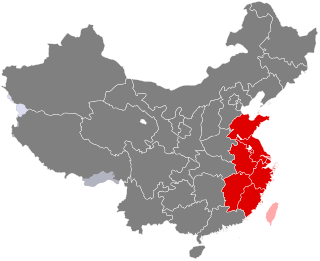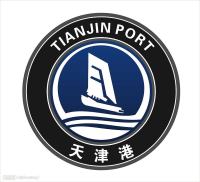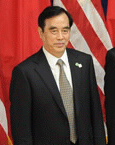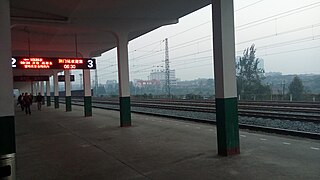
Jilin is one of the three provinces of Northeast China. Its capital and largest city is Changchun. Jilin borders North Korea and Russia to the east, Heilongjiang to the north, Liaoning to the south, and Inner Mongolia to the west. Along with the rest of Northeast China, Jilin underwent an early period of industrialization. However, Jilin's economy, characterized by heavy industry, has been facing economic difficulties with privatization. This prompted the central government to undertake a campaign called "Revitalize the Northeast". The region contains large deposits of oil shale.

East China is a geographical and a loosely defined cultural region that covers the eastern coastal area of China.

Longkou, formerly Huang County, is a port city in northeastern Shandong province, China, facing the Bohai Sea to the north and the Laizhou Bay to the west. Longkou, a county-level city, is administered by the prefecture-level city of Yantai. It is located in the northwest of Jiaodong Peninsula and the south bank of Bohai Bay, adjacent to Penglai District in the east, Qixia City and Zhaoyuan City in the south, Bohai Sea in the west and north, and facing Tianjin and Dalian across the sea. With a total area of 901 square kilometers, the city has jurisdiction over 5 subdistricts, 8 towns and 1 high-tech industrial park.

China United Coalbed Methane Corp., Ltd. (CUCBM), also known as China CBM, is state-owned company in China, which had exclusive rights until 2010 to explore, develop and produce coal mine methane in cooperation with overseas companies. The company was established in 1996.

The Port of Tianjin, formerly known as the Port of Tanggu, is the largest port in Northern China and the main maritime gateway to Beijing. The name "Tianjin Xingang", which strictly speaking refers only to the main seaport area, is sometimes used to refer to the whole port. The port is on the western shore of the Bohai Bay, centred on the estuary of the Haihe River, 170 km southeast of Beijing and 60 km east of Tianjin city. It is the largest man-made port in mainland China, and one of the largest in the world. It covers 121 square kilometers of land surface, with over 31.9 km of quay shoreline and 151 production berths at the end of 2010.

Sheng Guangzu was the last Chinese Minister of Railways before the position was abolished in March 2013, and the first Genenal Manager of China Railway Corporation. He was formerly the head of the General Administration of Customs of the People's Republic of China. He initially held several lower positions in the Ministry of Railways, and moved up the ranks starting in 2000. Sheng was also a member of the 17th Central Committee of the Chinese Communist Party.

National Administration of Traditional Chinese Medicine is a state administration of the People's Republic of China under the jurisdiction of the National Health Commission, responsible for the regulation of traditional Chinese medicine industry.

Xiuyu District is a district of the city of Putian, Fujian, People's Republic of China. The district executive, legislature and judiciary are in Hushi Town (笏石镇), together with the CPC and PSB branches.

Duodao District is a district of the city of Jingmen, Hubei, People's Republic of China.

Wang Yong is a Chinese politician who served as a State Councilor of the People's Republic of China from 2013 to 2023.
Yang Huanning is a former Chinese police and security official. He served as Executive Vice Minister of Public Security (minister-rank) from 2008 to 2015, then as Director of State Administration of Work Safety until his dismissal and demotion in 2017 for violation of party discipline. He was a member of the 18th Central Committee of the Chinese Communist Party.
Yang Gang is a former Chinese politician. Between 2010 and 2013 Yang served as the deputy director of the General Administration of Quality Supervision, Inspection and Quarantine (AQSIQ). Between 1999 and 2010, he was a top regional official in Xinjiang Uyghur Autonomous Region, serving first as the Communist Party Secretary of regional capital Urumqi and then Deputy Secretary of the Xinjiang regional Party Committee.

The Li Keqiang Government was the Central People's Government of China from 15 March 2013, when Premier Li Keqiang took office, until March 2023. It succeeded the Wen Jiabao government. Premier Li is ranked only second to Party general secretary Xi Jinping among 7 members of the 18th and 19th Politburo Standing Committee, top decision-making body of the Chinese Communist Party (CCP).
The office of Deputy Secretary-General of the State Council functions as the deputy to the Secretary-General. Currently, seven people serve as deputy secretary-general. The Deputy Secretary-General can hold concurrent positions. In general the Deputy Secretary-General has equivalent administrative rank as a vice minister of the state, though occasionally some Deputy Secretaries General will hold the rank of a minister.
Fang Quan, courtesy name Peiqing (培卿), was a late Qing Empire Mandarin, scholar, author and educator.

Xiong'an New Area is a state-level new area in the Baoding area of Hebei, China. Established in April 2017, the area is located about 100 kilometres (62 mi) southwest of Beijing and 50 kilometres (31 mi) east of downtown Baoding. Its main function is to serve as a development hub for the Beijing-Tianjin-Hebei (Jing-Jin-Ji) economic triangle. Additionally, "non-core" functions of the Chinese capital are expected to migrate here, including offices of some state-owned enterprises, government agencies, and research and development facilities. The city is planned to be erected by 2035, and to be completed by the middle of the 21st century.

The Ministry of Natural Resources is a ministry of the government of the People's Republic of China which is responsible for natural resources in the country. It was formed on 19 March 2018, taking on the responsibilities of the now-defunct Ministry of Land and Resources, State Bureau of Surveying and Mapping and State Oceanic Administration, with additional responsibilities coming from other departments and ministries.
Xin Changxing is a Chinese politician and the current Communist Party Secretary of Jiangsu. Previously, he served as Communist Party Secretary of Qinghai, Governor of Qinghai, and Deputy Communist Party Secretary of Anhui. Xin is a lifelong civil servant.
Liu Baohua is a former Chinese politician. He was investigated by China's top anti-graft agency in October 2020. Previously he served as deputy director of National Energy Administration.
Xiao Yaqing is a former Chinese engineer, business executive and politician who served as Minister of Industry and Information Technology from 2020 to 2022. Previously he served as director of the State Administration for Market Regulation and State-owned Assets Supervision and Administration Commission. He was an alternate member of the 17th Central Committee of the Chinese Communist Party and a member of the 18th Central Commission for Discipline Inspection of the Chinese Communist Party.












